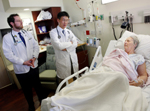|
|

|
Doctors look to curb stroke recurrence
|
by Prentiss Findlay
The Post and Courier
The Palmetto State needs to improve its care for stroke patients
because an alarming number of them are at risk of having another stroke
or dying within a year, according to an author of a new MUSC study.
“The data is quite shocking,” said Dr. Wuwei Feng, chief resident of the Department of Neuroscience.
 Senior
medical student Robby Hendry (left) join Dr. Wuwei Feng Feb. 16 in
talking with stroke patient Arline Hicks at MUSC. Feng and Hendry are
two of three co-authors of a study that looked at the risk of recurrent
strokes for patients who were hospitalized after their primary stroke. Senior
medical student Robby Hendry (left) join Dr. Wuwei Feng Feb. 16 in
talking with stroke patient Arline Hicks at MUSC. Feng and Hendry are
two of three co-authors of a study that looked at the risk of recurrent
strokes for patients who were hospitalized after their primary stroke.
Among the findings were that one out of 12 patients will likely soon
have another stroke, and one out of four stroke victims will likely die
within a year. The study looked at outcomes for 10,399 patients
statewide in 2002 for whom the primary diagnosis was stroke.
"The picture was pretty dismal,” Feng said.
Why that is the case is unanswered, Feng said. It could be inadequate
access to health care or not taking medications as prescribed, he said.
Whatever the cause, the study found that nearly half the stroke victims
were likely to experience another stroke, a heart attack or death
within four years, he said.
“Our findings suggest that South Carolina may have a long way to go in
terms of preventing and reducing the risk factors for recurrent
strokes,” Feng said. The issue needs more study for an effective stroke
prevention strategy, he said.
The study was published Tuesday, Feb. 16 in the journal Neurology.
“This points out how much room for improvement we have in the risk of
recurrent stroke,” said Dr. Robert J. Adams, a study co-author and
co-director of MUSC's Comprehensive Stroke and Cerebrovascular Program.
Eighty percent of strokes can be prevented by managing risk factors
such as blood pressure, diabetes, high cholesterol and heart disease.
Stopping smoking is important, Feng said. A first stroke is a wake-up
call. “That's a teachable moment that we need to work on,” Adams said.
There are two basic kinds of strokes. One is analogous to a “clogged
pipe” that reduces blood flow to the brain. The other is hemorrhaging
or bleeding into the brain caused by a “burst pipe.” Symptoms can
include loss of speech, numbness or weakness on one side of the body.
Headaches that lasted about a week were the first symptoms for Arline
Hicks of Easley, a stroke patient at MUSC. “I never had headaches in my
life,” she said.
Hicks, 80, lived on her own and had been very healthy. She grew her own
vegetables and never took medicine. She drove as far away as the beach
on her own. She had been a nurse at the Pickens County Health
Department and local emergency rooms, said her son, J.B. Hicks Jr.
She knew something was wrong when she got out of bed to go to the
bathroom, and she couldn't make her hand go to where the Tylenol was in
her medicine cabinet. She couldn't remember her son's phone number
either.
She did remember a neighbor's number and called. The neighbor dialed 911.
Hicks said during an interview in her hospital room Tuesday that she
had no stroke risk factors other than "kind of high" blood pressure
readings for about two months. Part of her vision has been affected by
the stroke.
Her condition has stabilized after being given a clot- dissolving drug, Feng said.
She had a rare stroke called cerebral venous thrombosis with subsequent
intracranial hematoma. She had a clot in the superior sagittal sinus.
"Now she is doing better. She was started with a medication to thin the
blood and hopefully the blood clot is also resolved with the
medication. At this moment, we are not sure the cause of her stroke,"
Feng said in an e-mail.
Editor's note: The article ran in the Feb. 17 issue of the Post and Courier and is reprinted with permission.
Friday, Feb. 26, 2010
|
|
|



